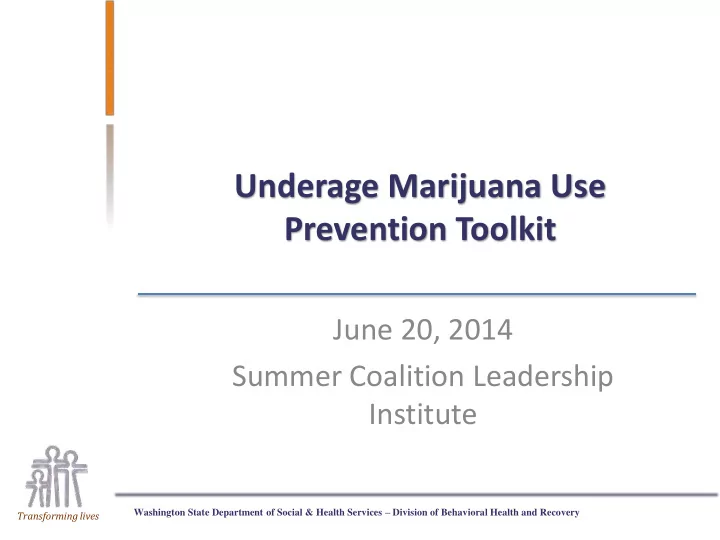

Underage Marijuana Use Prevention Toolkit June 20, 2014 Summer Coalition Leadership Institute Washington State Department of Social & Health Services – Division of Behavioral Health and Recovery Transforming lives
Community Prevention & Wellness Initiative Elements of the Toolkit DVD: Marijuana and Teens after I-502 - Mercer Island Communities that Care What Parent’s Need to Know - Washington State Liquor Control Board (WSLCB) Key Messages and Talking Points - DSHS I-502 State Agency Roles and Contacts Factsheet CD: Marijuana Prevention Messages (posters, billboards, etc.) - Best Care Prevention Parent’s Guide to preventing underage marijuana use - Seattle Children’s Hospital & Social Development Research Group (SDRG) Available on The Athena Forum: http://www.theathenaforum.org/parenttoolkit Washington State Department of Social & Health Services – Division of Behavioral Health and Recovery Transforming lives
Community Prevention 3 & Wellness Initiative What Parents Need to Know--LCB Washington State Department of Social & Health Services – Division of Behavioral Health and Recovery Transforming lives
Community Prevention 4 & Wellness Initiative Key Messages and Talking Points-- DSHS Washington State Department of Social & Health Services – Division of Behavioral Health and Recovery Transforming lives
Community Prevention 5 & Wellness Initiative Implementing I-502 Implementing State Agency Roles and Contacts Washington State Department of Social & Health Services – Division of Behavioral Health and Recovery Transforming lives
Community Prevention 6 & Wellness Initiative ‘Best Care’ Prevention Billboards Washington State Department of Social & Health Services – Division of Behavioral Health and Recovery Transforming lives
Community Prevention & Wellness Initiative Parent’s Guide to Preventing Underage Marijuana Use Pages 1 & 2 The good news! Children DO care about what parents say Communicate a no use attitude (and repeat/review it) – Start early – Be clear and specific How can coalitions incorporate this information into their work? – Dialogue in communities – Strategy selection and development How can coalition members share this information? – Develop activities to practice at coalition meetings for how to talk about these issues in order for members to become comfortable sharing this information in their circles of influence. Practice. – It always starts by planting small seeds. Washington State Department of Social & Health Services – Division of Behavioral Health and Recovery Transforming lives
Community Prevention & Wellness Initiative Talking with Parents Pages 3 & 4 Clear and specific expectations for their kids. Enforce realistic consequences. Have conversations with their child about refusal skills. Practice them. Don’t overreact. Washington State Department of Social & Health Services – Division of Behavioral Health and Recovery Transforming lives
Community Prevention & Wellness Initiative Modeling Appropriate Behavior for Kids Children learn from adult behavior. Clearly communicate the rules and consequences. Help parents understand it is okay to set rules and guidelines for their children. Fear of the discussion. Dispel the myth that talking about it will pique their interest. Washington State Department of Social & Health Services – Division of Behavioral Health and Recovery Transforming lives
Community Prevention & Wellness Initiative Practical Applications for Parents & Communities Technology help : teach parents how to communicate the way their child does: texting, email, facebook, twitter. Update on risk behavior trends to watch for (don’t scare them, inform them). Provide support — parent networking groups, prosocial activities unique to your local community needs, engage families in coalition efforts. Washington State Department of Social & Health Services – Division of Behavioral Health and Recovery Transforming lives
Community Prevention & Wellness Initiative Coalition Support for Schools Provide copies and awareness of The Marijuana Misuse/Abuse Prevention Toolkit Help inform schools to watch for edibles, paraphernalia, etc. Listen for conversations around school drug/alcohol policy updates due to I-502. – Try to be a part of informing districts on revising policies if possible. Build relationships with schools, help schools understand how best to partner with and develop coalition resources and partnerships. Washington State Department of Social & Health Services – Division of Behavioral Health and Recovery Transforming lives
Community Prevention & Wellness Initiative Tools for Coalitions Keep intervention messaging relevant to populations – Coalitions know their communities best! Adults and public health messaging: • Safe storage • Conversations about expectation Youth and public health messaging: • Loss of driving privileges • Reduced athletic performance • Lack of focus Washington State Department of Social & Health Services – Division of Behavioral Health and Recovery Transforming lives
Community Prevention 13 & Wellness Initiative Most k ids don’t use “The more we can keep the abstainers abstaining , the better.” ~Jason Kilmer, Ph.D., University of Washington Helping communities remember that most kids in their community don’t use substances can help counter-balance the confusing messaging kids may have received with the legalization of marijuana. Washington State Department of Social & Health Services – Division of Behavioral Health and Recovery Transforming lives
Community Prevention 14 & Wellness Initiative What Questions do you Have? Washington State Department of Social & Health Services – Division of Behavioral Health and Recovery Transforming lives
Community Prevention 15 & Wellness Initiative “Never doubt that a small group of thoughtful, committed citizens can change the world; indeed, it's the only thing that ever has .” ~Margaret Mead Washington State Department of Social & Health Services – Division of Behavioral Health and Recovery Transforming lives
Community Prevention 16 & Wellness Initiative Camille Goldy Prevention System Manager Division of Behavioral Health and Recovery (DBHR) Behavioral Health and Service Integration Administration WA Department of Social and Health Services camille.goldy@dshs.wa.gov 360-725-3786 Washington State Department of Social & Health Services – Division of Behavioral Health and Recovery Transforming lives
Recommend
More recommend